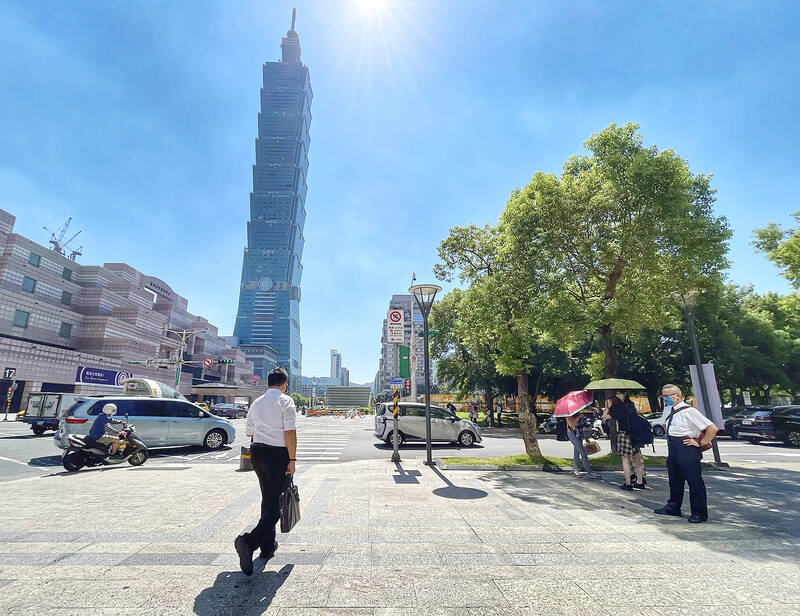S&P Global Ratings yesterday affirmed its “AA+” long-term and “A-1+” short-term credit ratings for Taiwan.
“The stable outlook reflects our expectation that over the next 24 months, risks to the ratings remain fairly balanced,” S&P said in a statement on its Web site.
Structural demand for Taiwanese semiconductor exports is likely to offset headwinds associated with long-standing geopolitical tensions, the ratings agency said.

Photo: CNA
The ratings are anchored on Taiwan’s robust external position and strong economic support, although an ongoing semiconductor downturn would curb Taiwan’s growth in the short term, it said.
Softening global demand for technology products has weighed on key export sectors in Taiwan, with its semiconductor sector particularly exposed to the slowdown, it said.
Weakening global demand would also hit non-tech sectors, particularly suppliers of commodities and consumer products, the agency said.
“We expect Taiwan’s economic growth to slow this year,” S&P said.
However, Taiwan’s electronics manufacturing sector remains dynamic, highly competitive and well-placed to benefit from long-term developments in technology-intensive integrated circuit chips, the agency said.
Although workers around the world have returned to their offices, reducing the need for remote-working equipment, demand for chips would likely remain robust due to a boom in artificial intelligence, 5G network deployment, big data processing and analytics, and electric vehicles, S&P said.
Taiwan’s growth prospects would be brighter than its peers at a similar income level, it said.
Effective policymaking has contributed to the government’s fiscal health, evidenced by robust domestic liquidity and low debt-servicing costs, it said.
“We expect Taiwan to maintain healthy fiscal metrics over the next three to five years,” S&P said.
However, cross-strait tensions continue to constrain Taiwan’s ratings, as a sharp deterioration in risk sentiment could hurt its export-reliant economy and fiscal position, it said.
The ratings agency said cross-strait relations would not deteriorate toward a major military conflict, adding that close economic and trade links between Taiwan and China support this assessment.

Taiwan’s long-term economic competitiveness will hinge not only on national champions like Taiwan Semiconductor Manufacturing Co. (TSMC, 台積電) but also on the widespread adoption of artificial intelligence (AI) and other emerging technologies, a US-based scholar has said. At a lecture in Taipei on Tuesday, Jeffrey Ding, assistant professor of political science at the George Washington University and author of "Technology and the Rise of Great Powers," argued that historical experience shows that general-purpose technologies (GPTs) — such as electricity, computers and now AI — shape long-term economic advantages through their diffusion across the broader economy. "What really matters is not who pioneers

In a high-security Shenzhen laboratory, Chinese scientists have built what Washington has spent years trying to prevent: a prototype of a machine capable of producing the cutting-edge semiconductor chips that power artificial intelligence (AI), smartphones and weapons central to Western military dominance, Reuters has learned. Completed early this year and undergoing testing, the prototype fills nearly an entire factory floor. It was built by a team of former engineers from Dutch semiconductor giant ASML who reverse-engineered the company’s extreme ultraviolet lithography (EUV) machines, according to two people with knowledge of the project. EUV machines sit at the heart of a technological Cold

TAIWAN VALUE CHAIN: Foxtron is to fully own Luxgen following the transaction and it plans to launch a new electric model, the Foxtron Bria, in Taiwan next year Yulon Motor Co (裕隆汽車) yesterday said that its board of directors approved the disposal of its electric vehicle (EV) unit, Luxgen Motor Co (納智捷汽車), to Foxtron Vehicle Technologies Co (鴻華先進) for NT$787.6 million (US$24.98 million). Foxtron, a half-half joint venture between Yulon affiliate Hua-Chuang Automobile Information Technical Center Co (華創車電) and Hon Hai Precision Industry Co (鴻海精密), expects to wrap up the deal in the first quarter of next year. Foxtron would fully own Luxgen following the transaction, including five car distributing companies, outlets and all employees. The deal is subject to the approval of the Fair Trade Commission, Foxtron said. “Foxtron will be

INFLATION CONSIDERATION: The BOJ governor said that it would ‘keep making appropriate decisions’ and would adjust depending on the economy and prices The Bank of Japan (BOJ) yesterday raised its benchmark interest rate to the highest in 30 years and said more increases are in the pipeline if conditions allow, in a sign of growing conviction that it can attain the stable inflation target it has pursued for more than a decade. Bank of Japan Governor Kazuo Ueda’s policy board increased the rate by 0.2 percentage points to 0.75 percent, in a unanimous decision, the bank said in a statement. The central bank cited the rising likelihood of its economic outlook being realized. The rate change was expected by all 50 economists surveyed by Bloomberg. The